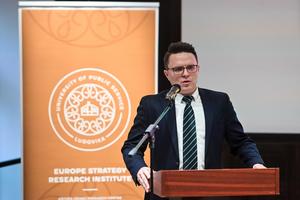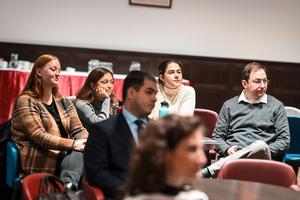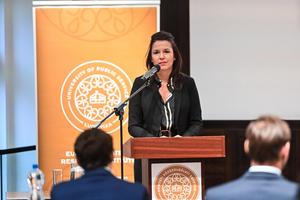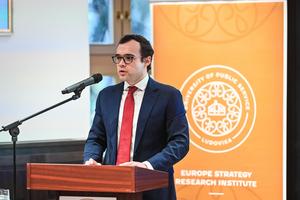"If we were to go to the United States and ask people there if they know about Poland, the Czech Republic, Hungary, or Slovakia, most of them might respond with a yes. However, if we were to ask them whether they know what the Visegrád Group is, there's a chance that some may have heard this term but wouldn't be able to explain it." Henry Barrett, a researcher at the Hungarian Research Network and the Europe Strategy Research Institute of the Ludovika University of Public Service (LUPS), and a fellow at the Europeum Institute in Prague, delivered a lecture on December 6, organized by the József Eötvös Research Center of LUPS.
The expert is researching the current state of EU integration among the Visegrád countries on the eve of the 20th anniversary of the Eastern enlargement. His research focuses on the rule of law conditionality and the war in Ukraine, examining how these processes and certain domestic political events influence the V4's integration into the EU.
Boglárka Koller, the Vice-Rector for International Affairs at LUPS, highlighted in her introduction that while we have seen examples in the past of neighboring countries cooperating and collectively representing the interests of Central Europe, the current situation does not reflect that. She added that it is worthwhile to draw attention to the advantages and disadvantages of this cooperation, considering the current political challenges.
In his lecture, Henry Barrett emphasized that the Fulbright program places great emphasis on mutual understanding between cultures. He traveled from North America to the region to study its historical context and political priorities.
He reminded the audience that the roots of the Visegrád Cooperation date back to 1335 when the kings of Bohemia, Hungary, and Poland formed a historical alliance in Visegrád. The current V4 group was officially established in February 1991 when Václav Havel, the then President of Czechoslovakia and later the Czech Republic, Lech Wałęsa, the President of Poland, and József Antall, the Prime Minister of Hungary, signed the Visegrád Declaration. Barrett emphasized that the agreement covered several key areas, including the removal of remnants of the communist bloc in Central Europe, overcoming historical hostilities among Central European countries, and the conviction that social transformation and possible European integration goals could be best achieved through cooperation.
"I deeply believe that since its formation in 1991, there has not been a period when this group has played such an important role in determining the future of Europe as it does now," said Henry Barrett. He drew attention to the fact that a crucial turning point has been reached for the future of the EU, which also affects the Central European region, as there will be EU elections next year, and, among other things, the new European Commission will be established during Hungary's presidency.
Barrett pointed out that due to the war in Ukraine, which is undoubtedly the most pressing issue for European security today, the EU has decisively focused its political competence to the east. He also noted that between 2003 and 2021, public support for cooperation significantly increased in the region, with V4 support growing by 14%, from 59% to 73%.
He emphasized that the V4 deals with topics such as EU enlargement, migration and external border protection, as well as the war in Ukraine in terms of economic and military aid. In his view, the rule of law conditionality and EU integration are two prominent examples of how the V4 works as an interest-based group. He added that the cooperation of the four countries is extremely sensitive to domestic politics, EU policy, and the development of international conflicts.
"Of course, this by no means means that the V4 is some kind of superstate, but that the group collectively has much greater influence in EU institutions and on the European stage than individual nation-states," emphasized Barrett. He believes that since the future of Europe is changing in 2024, the Visegrád Cooperation can strongly influence substantive political debates and thus shape the direction of the EU.
In the panel discussion after the lecture, besides the speakers mentioned above, Balázs Tárnok, the director of the Eötvös József Research Institute, and Gergő Medve-Bálint, lecturer at Corvinus University of Budapest, also participated. The panel discussed how the Visegrád countries have been subjected to strong external, mainly EU pressure over the past two decades. Barrett sees that the concept of interest-based relationships across borders and geographical distances is quite foreign to the American way of thinking.
Text: Éva Harangozó
Photo: Dénes Szilágyi




